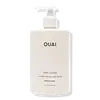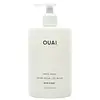Ouai Hand Lotion Versus Ouai Hand Wash
What's inside
What's inside
 Key Ingredients
Key Ingredients

No key ingredients
 Benefits
Benefits

 Concerns
Concerns

 Ingredients Side-by-side
Ingredients Side-by-side

Water
Skin ConditioningIsopropyl Palmitate
EmollientCaprylic/Capric Triglyceride
MaskingCetyl Alcohol
EmollientStearic Acid
CleansingPersea Gratissima Oil
Skin ConditioningRosa Canina Fruit Oil
EmollientSimmondsia Chinensis Seed Oil
EmollientLecithin
EmollientSodium Acrylates Copolymer
Glyceryl Stearate
EmollientPEG-100 Stearate
Acrylates/C10-30 Alkyl Acrylate Crosspolymer
Emulsion StabilisingDisodium EDTA
Aminomethyl Propanol
BufferingChlorphenesin
AntimicrobialPhenoxyethanol
PreservativeParfum
MaskingCitronellol
PerfumingLimonene
PerfumingHydroxycitronellal
PerfumingLinalool
PerfumingCitral
PerfumingWater, Isopropyl Palmitate, Caprylic/Capric Triglyceride, Cetyl Alcohol, Stearic Acid, Persea Gratissima Oil, Rosa Canina Fruit Oil, Simmondsia Chinensis Seed Oil, Lecithin, Sodium Acrylates Copolymer, Glyceryl Stearate, PEG-100 Stearate, Acrylates/C10-30 Alkyl Acrylate Crosspolymer, Disodium EDTA, Aminomethyl Propanol, Chlorphenesin, Phenoxyethanol, Parfum, Citronellol, Limonene, Hydroxycitronellal, Linalool, Citral
Water
Skin ConditioningGlycerin
HumectantSodium C14-16 Olefin Sulfonate
CleansingAcrylates Copolymer
Cocamidopropyl Betaine
CleansingJojoba Esters
EmollientPEG-40 Hydrogenated Castor Oil
EmulsifyingSodium Methyl Cocoyl Taurate
CleansingCocamide Mipa
EmulsifyingPolyquaternium-7
Simmondsia Chinensis Seed Oil
EmollientRosa Canina Fruit Oil
EmollientPersea Gratissima Oil
Skin ConditioningPolysorbate 20
EmulsifyingPEG-150 Pentaerythrityl Tetrastearate
EmulsifyingPEG-6 Caprylic/Capric Glycerides
EmulsifyingDisodium EDTA
Benzophenone-4
UV AbsorberSodium Chloride
MaskingTetrasodium EDTA
Sodium Hydroxide
BufferingTocopherol
AntioxidantHydroxyacetophenone
AntioxidantPropylene Glycol
HumectantIsopropyl Alcohol
SolventEthylhexylglycerin
Skin ConditioningSodium Benzoate
MaskingPhenoxyethanol
PreservativeParfum
MaskingCI 60730
Cosmetic ColorantCitronellol
PerfumingLimonene
PerfumingHydroxycitronellal
PerfumingLinalool
PerfumingWater, Glycerin, Sodium C14-16 Olefin Sulfonate, Acrylates Copolymer, Cocamidopropyl Betaine, Jojoba Esters, PEG-40 Hydrogenated Castor Oil, Sodium Methyl Cocoyl Taurate, Cocamide Mipa, Polyquaternium-7, Simmondsia Chinensis Seed Oil, Rosa Canina Fruit Oil, Persea Gratissima Oil, Polysorbate 20, PEG-150 Pentaerythrityl Tetrastearate, PEG-6 Caprylic/Capric Glycerides, Disodium EDTA, Benzophenone-4, Sodium Chloride, Tetrasodium EDTA, Sodium Hydroxide, Tocopherol, Hydroxyacetophenone, Propylene Glycol, Isopropyl Alcohol, Ethylhexylglycerin, Sodium Benzoate, Phenoxyethanol, Parfum, CI 60730, Citronellol, Limonene, Hydroxycitronellal, Linalool
 Reviews
Reviews

Ingredients Explained
These ingredients are found in both products.
Ingredients higher up in an ingredient list are typically present in a larger amount.
Citronellol is used to add fragrance/parfum to a product. It is often derived from plants such as roses. In fact, it can be found in many essential oils including geranium, lavender, neroli, and more. The scent of Citronellol is often described as "fresh, grassy, and citrus-like".
Since the Citronellol molecule is already unstable, Citronellol becomes irritating on the skin when exposed to air.
Citronellol is a modified terpene. Terpenes are unsaturated hydrocarbons found in plants. They make up the primary part of essential oils.
Citronellol is not able to be absorbed into deeper layers of the skin. It has low permeability,
Citronellol is also a natural insect repellent.
Learn more about CitronellolDisodium EDTA plays a role in making products more stable by aiding other preservatives.
It is a chelating agent, meaning it neutralizes metal ions that may be found in a product.
Disodium EDTA is a salt of edetic acid and is found to be safe in cosmetic ingredients.
Learn more about Disodium EDTAHydroxycitronellal is a fragrance created from citronellal. The smell of hydroxycitronellal is often described as "citrus-like" or "melon-like".
Hydroxycitronellal is a known EU allergen and may cause irritation when applied to the skin.
Limonene is a fragrance that adds scent and taste to a formulation.
It's found in the peel oil of citrus fruits and other plants such as lavender and eucalyptus. The scent of limonene is generally described as "sweet citrus".
Limonene acts as an antioxidant, meaning it helps neutralize free radicals.
When exposed to air, oxidized limonene may sensitize the skin. Because of this, limonene is often avoided by people with sensitive skin.
The term 'fragrance' is not regulated in many countries. In many cases, it is up to the brand to define this term. For instance, many brands choose to label themselves as "fragrance-free" because they are not using synthetic fragrances. However, their products may still contain ingredients such as essential oils that are considered a fragrance.
Learn more about LimoneneLinalool is a fragrance and helps add scent to products. It's derived from common plants such as cinnamon, mint, citrus, and lavender.
Like Limonene, this ingredient oxidizes when exposed to air. Oxidized linalool can cause allergies and skin sensitivity.
This ingredient has a scent that is floral, spicy tropical, and citrus-like.
Learn more about LinaloolParfum is a catch-all term for an ingredient or more that is used to give a scent to products.
Also called "fragrance", this ingredient can be a blend of hundreds of chemicals or plant oils. This means every product with "fragrance" or "parfum" in the ingredients list is a different mixture.
For instance, Habanolide is a proprietary trade name for a specific aroma chemical. When used as a fragrance ingredient in cosmetics, most aroma chemicals fall under the broad labeling category of “FRAGRANCE” or “PARFUM” according to EU and US regulations.
The term 'parfum' or 'fragrance' is not regulated in many countries. In many cases, it is up to the brand to define this term.
For instance, many brands choose to label themselves as "fragrance-free" because they are not using synthetic fragrances. However, their products may still contain ingredients such as essential oils that are considered a fragrance by INCI standards.
One example is Calendula flower extract. Calendula is an essential oil that still imparts a scent or 'fragrance'.
Depending on the blend, the ingredients in the mixture can cause allergies and sensitivities on the skin. Some ingredients that are known EU allergens include linalool and citronellol.
Parfum can also be used to mask or cover an unpleasant scent.
The bottom line is: not all fragrances/parfum/ingredients are created equally. If you are worried about fragrances, we recommend taking a closer look at an ingredient. And of course, we always recommend speaking with a professional.
Learn more about ParfumPersea Gratissima Oil is also known as avocado oil.
Avocado Oil has antioxidant properties. It is mostly made up of the glycerides of fatty acids. About 67% of these fatty acids is made up of oleic acid. Palmitic acid and linoleic acid are also present.
These fatty acids help hydrate and soften the skin. It may increase collagen content in the skin. Collagen helps keep your skin plump and firm. This ingredient helps reduce inflammation and has not shown to clog pores.
This ingredient may not be fungal-acne safe due to its high fatty acid content.
Avocados also have B vitamins, vitamin K, vitamin C, vitamin E, and potassium.
Learn more about Persea Gratissima OilPhenoxyethanol is a preservative that has germicide, antimicrobial, and aromatic properties. Studies show that phenoxyethanol can prevent microbial growth. By itself, it has a scent that is similar to that of a rose.
It's often used in formulations along with Caprylyl Glycol to preserve the shelf life of products.
Rosehip Oil is a non-fragrant plant oil. Rosehips are a fruit from a rose bush and are edible. This oil has skin conditioning and hydrating properties.
Rosehip contains Vitamin C, Vitamin E, fatty acids and linolenic acids. These nourish your skin barrier. Having hydrated skin may help reduce the appearance of fine-lines and wrinkles.
Another great component of Rosehip Oil is Vitamin A, or retinol. Vitamin A encourages your skin to create more collagen.
Rosehip oil may help with reducing pigmentation. The lycopene and beta-carotene have skin-lightening properties. However, more studies are needed to confirm this.
Learn more about Rosa Canina Fruit OilThis oil comes from the seeds of the desert shrub called Jojoba. It is more commonly known as jojoba oil, a non-comedogenic oil.
Jojoba oil does not contain fragrance and has many fatty-acids, making it a great soothing ingredient.
It also contains Vitamin E, a great moisturizing ingredient. Vitamin E is also an antioxidant and protects your skin against oxidative damage.
This ingredient humectant properties, meaning it helps draw moisture from the air. This helps keep your skin hydrated.
While jojoba has antibacterial properties, it is only able to kill some strains of bacteria.
Studies also show it helps in wound healing. In fact, Indigenous cultures have used jojoba as a moisturizer and to help treat burns for centuries.
Fun fact: Jojoba oil similar to natural human skin sebum, so it has a great effect on dry skin. It is also promising with helping to regulate sebum production.
Due to its fatty acid content, Jojoba oil may not be fungal acne safe. We recommend speaking with a professional if you have any concerns.
Learn more about Simmondsia Chinensis Seed OilWater. It's the most common cosmetic ingredient of all. You'll usually see it at the top of ingredient lists, meaning that it makes up the largest part of the product.
So why is it so popular? Water most often acts as a solvent - this means that it helps dissolve other ingredients into the formulation.
You'll also recognize water as that liquid we all need to stay alive. If you see this, drink a glass of water. Stay hydrated!
Learn more about Water